 Between my love for honey and a proclivity for serial entrepreneurship, I am now officially obsessed with bees. I finally understand why hipster beekeepers in Brooklyn and the East Village toil away on their rooftops clad in airtight suits and veiled hoods.
Between my love for honey and a proclivity for serial entrepreneurship, I am now officially obsessed with bees. I finally understand why hipster beekeepers in Brooklyn and the East Village toil away on their rooftops clad in airtight suits and veiled hoods.
Don’t be fooled into thinking their hours spent in the pursuit of making artisanal honey are simply the perfect Instagrammable hobby designed to boost their social cache. Honey is a lucrative business. An all-consuming fascination with honeybees has swarmed the globe and is inciting action from regular citizens and governments alike.
I am not alone in my scientific and economic obsession with the honeybee (Apis mellifera) nor in my mild addiction to their liquid gold output. Barbados imports about one million dollars BDS of honey every year, the most of any country in the Caribbean by far. In the last four years alone demand has nearly doubled. Local small batch production is also beginning to gain popularity and if supported could drastically reduce costly import fees. The Barbados Agricultural Society has over 30 registered beekeepers and growing which doesn’t include minders registered as farmers or otherwise. In 2018 the National Conservation Commission established an apiary lab to assist the Ministry of Agriculture and support entrepreneurial bee enthusiasts.
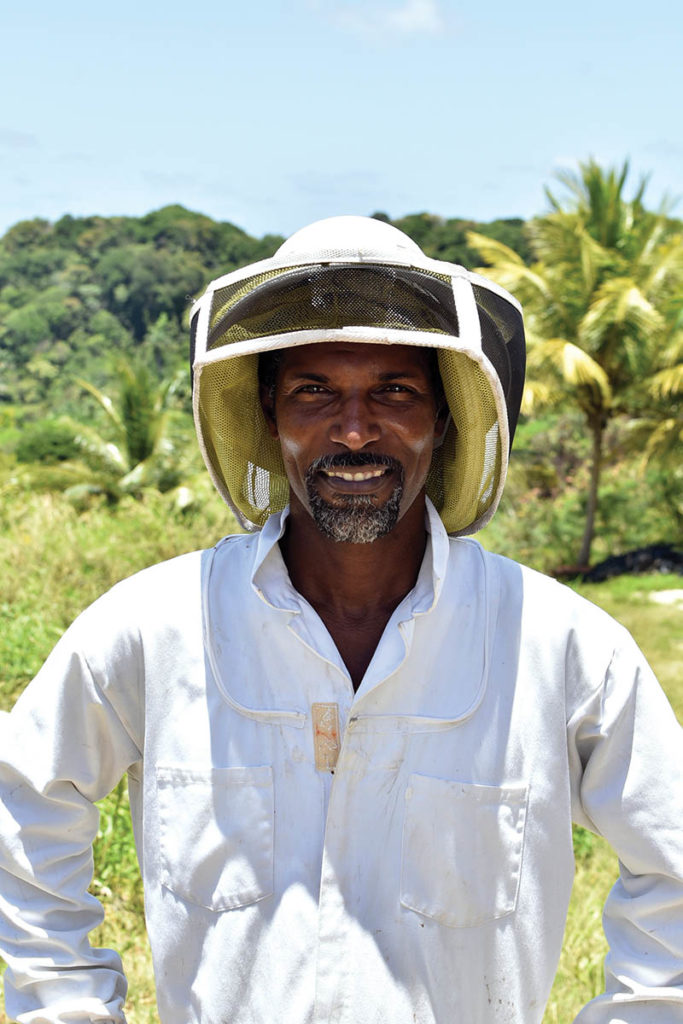 Evolutionary Wonder
Evolutionary Wonder
Anatomically, bees pack and incredible amount of technology into their tiny frames. Evolving over 100 million years, the honeybee has had plenty of time to perfect their craft. The number of patents they could register is mind boggling to our seemingly inferior human minds benefiting from only a quarter of a million years on this earth in comparison. For example, bees are equipped with two sets of eyes. The compound eyes, which are easily recognizable to humans, allow the bee to see the world in polarized light. Essentially, bees have the same technology now incorporated into your designer sunglasses that allows you to see in harsh daylight. A bee’s simple eye has a single lens which acts almost like x-ray vision to identify pollen.
Nature’s design superiority doesn’t stop there. Honeybees have developed their own language and means of communicating aptly named ‘the honeybee dance’ which consists of two different styles – the round and the waggle. These movements are choreographed together to relay information when a worker bee returns to the hive from a foraging pursuit. Bees dance in a simple round or circular pattern to relay that there are pollen rich sources within 50 meters of the hive. The waggle is used to construct a more intricate treasure map depicting precise distances and trajectories. A bee’s internal GPS is so accurate they can communicate the exact degree variation from the sun’s vertical position.
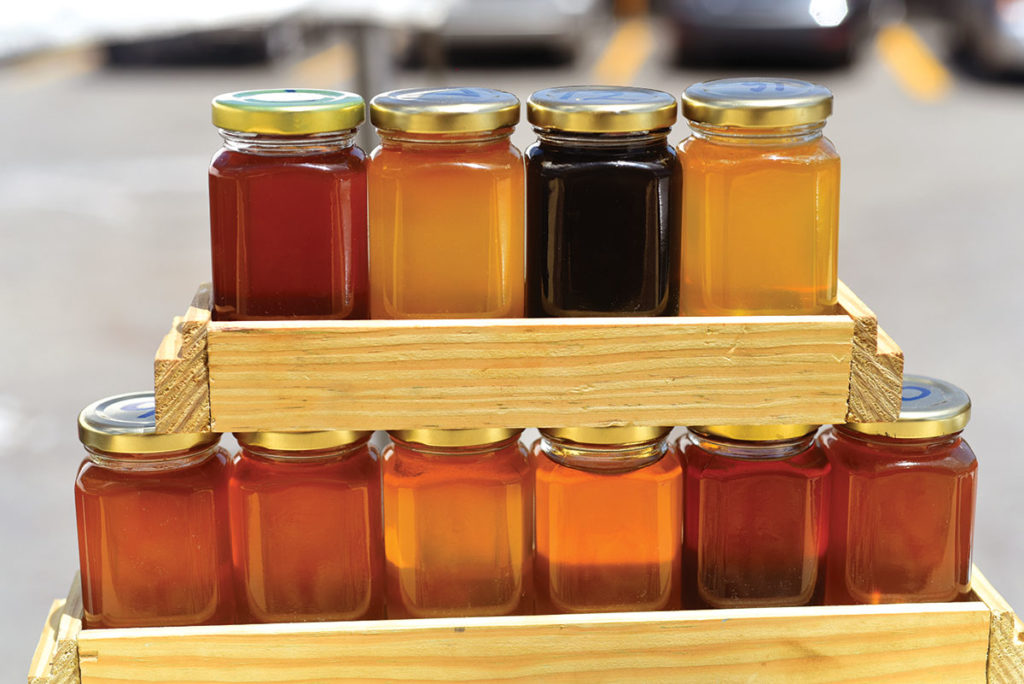 The Queen bee is blessed with her own revolutionary skill – she can choose the gender of the eggs she lays. Each day she decides by way of fertilization which of the two thousand eggs she lays should become female worker bees versus male drones whose exclusive purpose is to mate with the Queen. Unfortunately if Drones are successful in their quest they die soon after from bodily injuries incurred during their brief moment of glory. Drones that are unsuccessful, and therefore live to see another day, are forcibly removed from the hive. Trained for nothing else, they cannot survive on their own and soon die of starvation.
The Queen bee is blessed with her own revolutionary skill – she can choose the gender of the eggs she lays. Each day she decides by way of fertilization which of the two thousand eggs she lays should become female worker bees versus male drones whose exclusive purpose is to mate with the Queen. Unfortunately if Drones are successful in their quest they die soon after from bodily injuries incurred during their brief moment of glory. Drones that are unsuccessful, and therefore live to see another day, are forcibly removed from the hive. Trained for nothing else, they cannot survive on their own and soon die of starvation.
Based on a colony’s absolute reliance on their Queen, one might wonder if a hive is governed as some sort of ‘Lady Dictatorship’ where the Queen bee (no, not Beyonce) reigns supreme. On closer inspection, you will find that the hive is organized more as a collaborative matriarchal society. Worker bees (all female) are born by the thousands and carry out all of the daily tasks needed to produce honey and to keep the hive strong. They tend to larvae and carry, store and forage for food depending on their seniority. It is worker bees that sense when a hive is becoming overpopulated and trigger a swarm where one Queen and a portion of the hive’s population risk everything to venture out and create a new hive. One worker in particular will be the one to scout the new location. The worker bees also determine when a new Queen is to be groomed by feeding particular larvae exclusively with royal jelly. It is incredible to think that these bees have the innate intelligence and strategic decision-making needed to ensure the longevity of a hive when their life span is only five to six weeks.
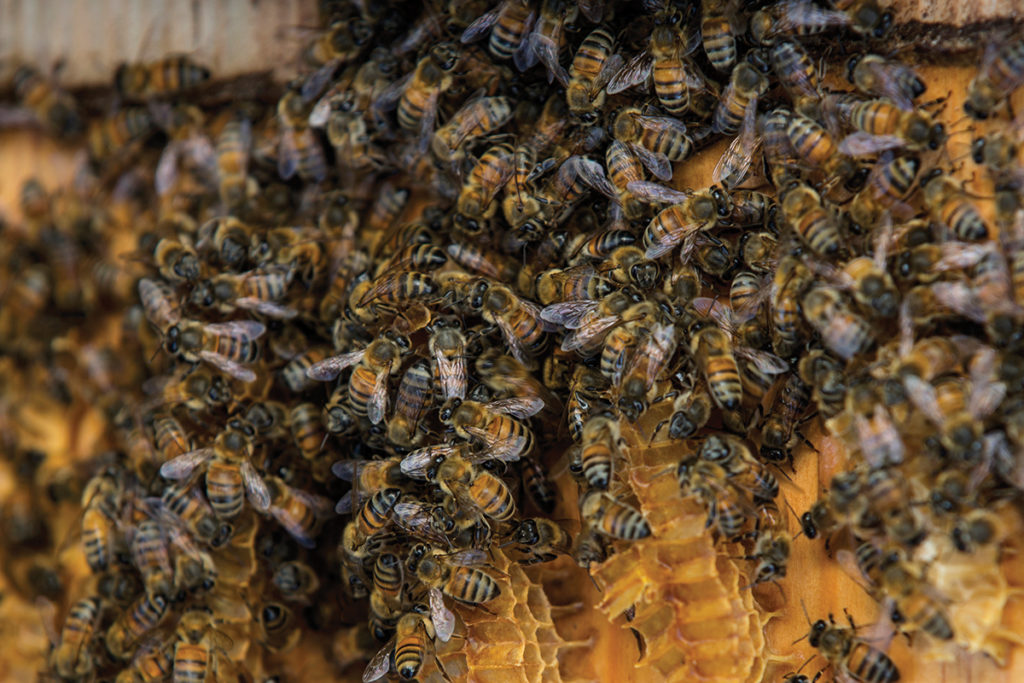 Near the end of life, worker bees graduate to their most important role, foraging nectar and pollen. They collect these valuable assets from flowers and store them in a special stomach, consuming only what’s necessary to get them back to the hive. Upon their safe return, they disgorge their collections to an eagerly waiting younger worker bee. The heat created by the vibration of her wings helps to evaporate some of the water content before she passes the by-product on to a chain of her fellow workers. The final result is a glistening bead of pure honey which is sealed into a hexagonal cell with a layer of wax.
Near the end of life, worker bees graduate to their most important role, foraging nectar and pollen. They collect these valuable assets from flowers and store them in a special stomach, consuming only what’s necessary to get them back to the hive. Upon their safe return, they disgorge their collections to an eagerly waiting younger worker bee. The heat created by the vibration of her wings helps to evaporate some of the water content before she passes the by-product on to a chain of her fellow workers. The final result is a glistening bead of pure honey which is sealed into a hexagonal cell with a layer of wax.
The Business of Bees
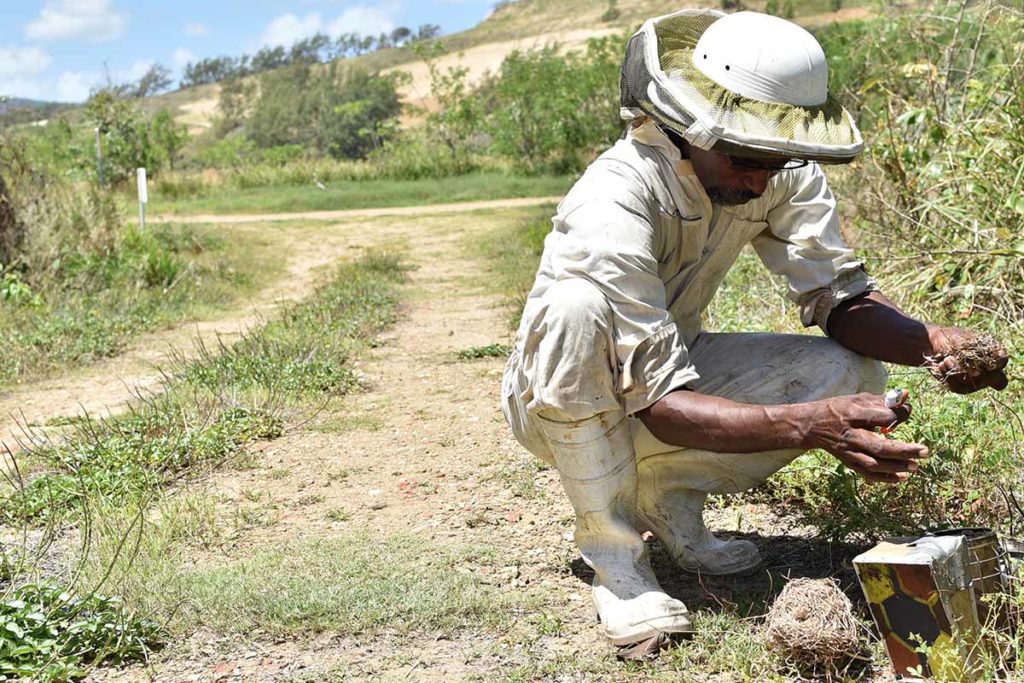 It is time to recognize that bees are friends not foes and harness their extraordinary skills and productivity to boost our own economy. Not only do they produce honey, which we are currently importing by the tonne to curb our insatiable appetites, they also have the power to increase our crop yields at virtually no cost.
It is time to recognize that bees are friends not foes and harness their extraordinary skills and productivity to boost our own economy. Not only do they produce honey, which we are currently importing by the tonne to curb our insatiable appetites, they also have the power to increase our crop yields at virtually no cost.
The benefit of buying or establishing a colony of bees is that you are investing in a fully functioning business that comes complete with a skilled workforce. You need only to supply the factory. The employees manage their own recruiting and human resources producing new workers and expunging underperformers daily. They assume their specific roles in the hive requiring zero on-going training or performance reports and no one ever asks for a pay raise.
Like any technology company that acquires a smaller operation, there is often a precarious transition period as everyone gets used to working together. New beekeepers are sometimes so enamoured with their new business that they resemble an anxious and overbearing factory manager. They want to keep tabs on their employees at all times and tour friends through their new facility. However, each time a keeper opens her hive to supervise the workshop, she disrupts the functioning systems and processes and leaves the hive susceptible to outside influences such as parasitic infestations. When minding bees, less supervision and oversight is key. A CEO need only to assert managerial control to prevent or solve major issues and of course to withdraw her dividends.
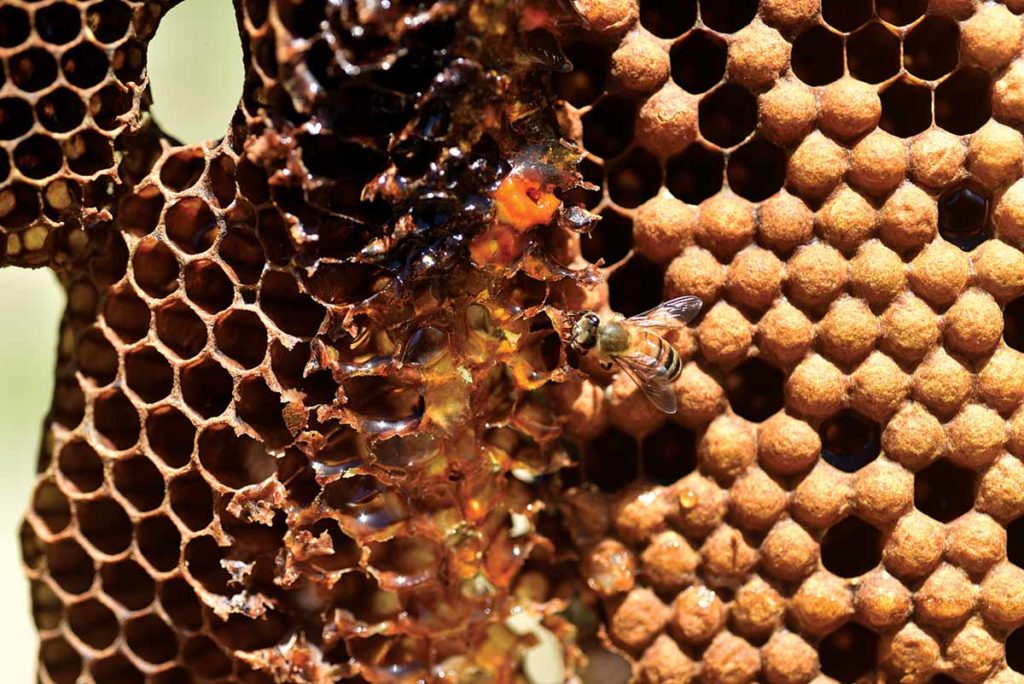 The start-up costs for an initial hive are relatively low. It costs about $1200 BDS to assemble a kit including a beekeeping suit, smoker, brush, tools, a box (manmade hive) and a colony of bees. To expand operations, you need only an additional box and slightly more space. Perhaps most exciting to budding ‘beepreneurs’ is that the revenue per hive is estimated at $1200 every flow season on a 30 pound honey harvest. Current beekeepers in Barbados aim to harvest three to four times a year. In many countries, hives are rented and temporarily relocated to farms in order to aid crop pollination and increase yield. Experienced beekeepers can also charge to maintain hives for others at $60 BDS per inspection. Excited by the potential return on investment, local exterminators in Barbados have started to collect the bee hives they are called to remove building a profitable side business.
The start-up costs for an initial hive are relatively low. It costs about $1200 BDS to assemble a kit including a beekeeping suit, smoker, brush, tools, a box (manmade hive) and a colony of bees. To expand operations, you need only an additional box and slightly more space. Perhaps most exciting to budding ‘beepreneurs’ is that the revenue per hive is estimated at $1200 every flow season on a 30 pound honey harvest. Current beekeepers in Barbados aim to harvest three to four times a year. In many countries, hives are rented and temporarily relocated to farms in order to aid crop pollination and increase yield. Experienced beekeepers can also charge to maintain hives for others at $60 BDS per inspection. Excited by the potential return on investment, local exterminators in Barbados have started to collect the bee hives they are called to remove building a profitable side business.
Our local demand for honey and the resulting economy has the power to provide lucrative self-employment on the island. Once harvested, raw honey must still be processed to remove any unwanted foreign particles such as bee parts or wax. Honey in its raw form can be further pasteurized to produce a standardized honey that remains liquid longer. Both processes would benefit from a more cooperative effort serving multiple producers collectively.
We have all the necessary components for a flourishing industry including a variety of plants and fauna that flower all year round. Producing enough honey to satisfy our sweet cravings will require a new business model, perhaps one that has yet to be tested in historically successful industries such as rum, sugar and cotton.

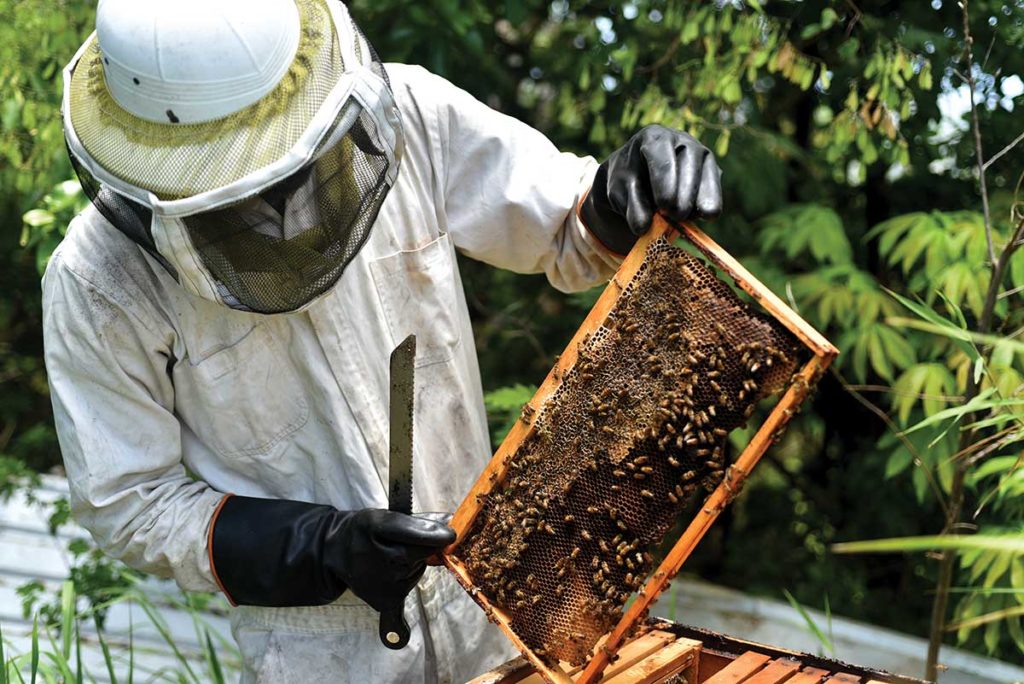 Between my love for honey and a proclivity for serial entrepreneurship, I am now officially obsessed with bees. I finally understand why hipster beekeepers in Brooklyn and the East Village toil away on their rooftops clad in airtight suits and veiled hoods.
Between my love for honey and a proclivity for serial entrepreneurship, I am now officially obsessed with bees. I finally understand why hipster beekeepers in Brooklyn and the East Village toil away on their rooftops clad in airtight suits and veiled hoods.